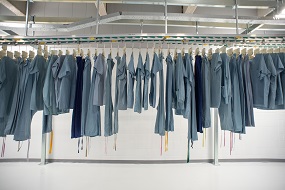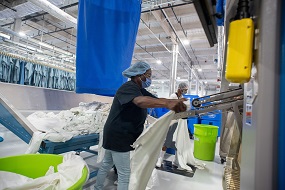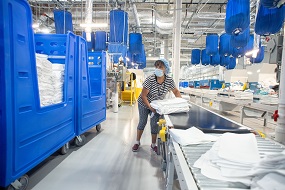Pandemic Must-Haves: PPE and Clean, Sanitized Scrubs & Gowns

DETROIT (Oct. 28, 2020) – Personal protective equipment like facemasks, gloves and gowns are life-saving must-haves for healthcare providers, and never more so than in the fight against COVID-19. Just as critical is an ample supply of clean and sanitized scrubs for healthcare workers and fresh gowns and bed linens for patients.
With COVID-19 cases on the rise in Michigan and flu season approaching, there will be increased demand for clean laundry. What better way to meet that need than a modern medical laundry facility that washes, presses and folds 700,000 pounds of laundry every week.
Today, Henry Ford Health System, Michigan Medicine and Saint Joseph Mercy Health System unveiled their $48 million shared laundry facility that is expected to achieve both significant savings from more efficient operations and better meet the needs of these three health systems. Located in the city of Detroit, the new eco-friendly facility has the capacity to service 78 million pounds of health care linens – scrubs, bed sheets, pillowcases, blankets, towels and scrubs for inpatient and outpatient use – every year for the health systems combined.
Executives from the health systems were joined by Detroit Mayor Mike Duggan in a virtual news conference to underscore the significance of this major economic investment in healthcare infrastructure in the state’s largest city – in the middle of a pandemic.
 “Our collaboration is a true model for how health care institutions can work together to achieve efficiencies and spur economic renewal in our region,” said Bob Riney, Henry Ford’s president of Healthcare Operations and chief operating officer. “Laundry service is critical to our everyday operations for our patients and team members, and this investment will have meaningful impact for years to come.”
“Our collaboration is a true model for how health care institutions can work together to achieve efficiencies and spur economic renewal in our region,” said Bob Riney, Henry Ford’s president of Healthcare Operations and chief operating officer. “Laundry service is critical to our everyday operations for our patients and team members, and this investment will have meaningful impact for years to come.”
Since opening June 1, the facility has been running two shifts over a six-day work week. At 115,000-square feet, it is one of the largest shared medical laundry facilities in the country and more than double the size of the previous laundry plant. It is on track to service about 34 million pounds of laundry by year’s end. That includes a new piece of apparel – a washable medical gown that will extend the supply of a valuable piece of PPE for frontline workers. Made of polymer fabric, the gown can be washed 100 times before it needs to be discarded.
“We’ve already seen the benefits of partnering with peer health systems to improve service and reduce costs. I am proud of our collective efforts to invest in a modern facility, new jobs and to provide highly reliable service. Locating the facility in Detroit supports U-M’s commitment to the city,” said Tony Denton, senior vice president and chief operating officer of the U-M Health System for Michigan Medicine. “While it all takes place behind the scenes, laundry and linen services are essential to the daily provision of health care services, with emphasis on patient and caregiver safety.”
The facility employs about 150 workers, of which 83 are new hires. All positions pay competitive wages, with health care and retirement benefits. Effective November 1, new hires will earn an hourly rate of $15.04 after a 90-day probationary period. Ricky Nelson, 61, of Detroit, was hired one year ago after spending 17 years in prison for selling cocaine, is grateful for the opportunity to rebuild his life.
The development was made possible by Henry Ford acquiring the longtime vacant 10-acre industrial property at 1150 Elijah McCoy Drive in 2017. It’s located in the Northwest Goldberg neighborhood north of I-94 and west of the Lodge Freeway and is the latest health care development in the ongoing revitalization of that area. In 2015, Cardinal Health opened a new distribution plan on Rose Parks Boulevard that services local health care systems. The Henry Ford Cancer Institute will soon open its new cancer facility nearby.
"Laundry may not seem like an exciting thing, but this project is so good for our city in so many ways. It's making sure our front-line health care workers and the patients they serve have gowns and linens cleaned to the highest standards as we battle COVID-19,” said Detroit Mayor Mike Duggan. “It also has taken another parcel of vacant land and put it back to productive use that benefits the community and employs more Detroiters. I'm grateful to Henry Ford Health System, Michigan Medicine, Saint Joseph Mercy Health System and the Metropolitan Detroit Area Hospital Services for this investment in our city and its people."

The facility is owned and operated by the Metropolitan Detroit Area Hospital Services (MDAHS), a Michigan nonprofit corporation. The MDAHS was founded by four hospitals in the early 1970s including St. Joseph Mercy Ann Arbor hospital. In the 1980s Henry Ford joined MDAHS, which later grew to include other Saint Joseph Mercy Health System hospitals. Michigan Medicine joined the MDAHS in February 2019.
"This laundry facility illustrates how the health care industry can come together to share efficiencies that lower the cost of health care, and ultimately, improve patient experience," said Rob Casalou, president and CEO, Trinity Health Michigan. "Some of the employees at the facility have worked there for decades, and we are thrilled that this facility is now providing more jobs in a state-of-the-art, safe work environment in Detroit."
The sprawling facility combines automated technology with numerous sustainable initiatives to minimize operating costs and responsibly steward the environment. Key features:
- Clean and dirty laundry bags are moved on a monorail system.
- Waste-water heat reclamation system captures heat from wastewater and uses it to preheat fresh water during the washing process, reducing natural gas consumption. The system recycles water using only 0.7 gallons of water per pound of linen washed; conventional home washers use on average 3 gallons of water per pound of linen washed.
- High efficiency tunnel washers have a 220-pound capacity compared to conventional home washers that have an 8-pound capacity.
- LED lighting increases energy efficiency by 30%.
- High efficiency dryers reduce drying times and emissions.
- Thermal oil ironers reduce natural gas use and steam boiler emissions.
- Linen receptables are sanitized through a mini car wash system.
For nearly four decades, Henry Ford and St. Joe’s, a member of Trinity Health headquartered in Livonia, Mich., have jointly owned MDAHS, which had operated a shared laundry facility on Oakman Boulevard on Detroit’s west side. Aging equipment and infrastructure and limited capacity rendered the facility no longer sustainable for future use.
Discussions for a new shared laundry facility begin in 2016, with a commitment to keeping the new facility in Detroit. Construction on the facility began in 2019 and was completed on schedule in spring of 2020. The laundry facility occupies about 40 percent of the 10-acre property, with Henry Ford retaining ownership of the remaining undeveloped land for future use.
MDAHS issued $48 million in bonds to finance the facility. No government funds were used to finance construction.
###
MEDIA CONTACTS:
David Olejarz / David.Olejarz@hfhs.org / 313.303.0606
Mary Masson / mfmasson@med.umich.edu / 734.764.2220
Laura Blodgett / Laura.Blodgett@stjoeshealth.org / 734.712.4536
About Henry Ford Health System
Founded in 1915 by Henry Ford himself, Henry Ford Health System is a non-profit, integrated health system committed to improving people’s lives through excellence in the science and art of healthcare and healing. Henry Ford Health System consists of six hospitals including Henry Ford Hospital in Detroit; Henry Ford Macomb Hospitals; Henry Ford Wyandotte Hospital; Henry Ford West Bloomfield Hospital; Henry Ford Allegiance in Jackson, MI; and Henry Ford Kingswood Hospital – an inpatient psychiatric hospital.
Henry Ford Health System also includes Henry Ford Medical Group; Henry Ford Physician Network; more than 250 outpatient facilities; Henry Ford Pharmacy; Henry Ford OptimEyes; and other healthcare services. Our not-for-profit health plan, Health Alliance Plan (HAP) provides health coverage for more than 540,000 people.
As one of the nation’s leading academic medical centers, Henry Ford Health System trains more than 3,000 medical students, residents, and fellows annually in more than 50 accredited programs, and has trained nearly 40% of the state’s physicians. Our dedication to education and research is supported by nearly $100 million in annual grants from the National Institutes of Health and other public and private foundations.
Henry Ford Health System employs more than 33,000 people, including more than 1,600 physicians, more than 6,600 nurses and 5,000 allied health professionals. For more information, visit HenryFord.com.
About Michigan Medicine
At Michigan Medicine, we advance health to serve Michigan and the world. We pursue excellence every day in our three hospitals, 125 clinics and home care operations that handle more than 2.3 million outpatient visits a year, as well as educate the next generation of physicians, health professionals and scientists in our U-M Medical School.
Michigan Medicine includes the top ranked U-M Medical School and the University of Michigan Health System, which includes the C.S. Mott Children’s Hospital, Von Voigtlander Women’s Hospital, University Hospital, the Frankel Cardiovascular Center and the Rogel Cancer Center. Michigan Medicine’s adult hospitals were ranked no. 11 in the nation by U.S. News and World Report in 2020-21 and C.S. Mott Children’s Hospital was the only children’s hospital in Michigan nationally ranked in all 10 pediatric specialties analyzed by U.S. News and World Report for 2020-21. The U-M Medical School is one of the nation's biomedical research powerhouses, with total research funding of more than $500 million.
More information is available at www.michiganmedicine.org
About Saint Joseph Mercy Health System
Saint Joseph Mercy Health System (SJMHS) is a health care organization serving seven counties in southeast Michigan including Livingston, Washtenaw, Wayne, Oakland, Macomb, Jackson, and Lenawee. It includes 548-bed St. Joseph Mercy Ann Arbor, 497-bed St. Joseph Mercy Oakland in Pontiac, 304-bed St. Mary Mercy Livonia, 66-bed St. Joseph Mercy Livingston in Howell, and 133-bed St. Joseph Mercy Chelsea. Combined, the five hospitals are licensed for 1,548 beds, have five outpatient health centers, six urgent care facilities, more than 25 specialty centers; employ more than 15,300 individuals and have a medical staff of nearly 2,700 physicians. SJMHS has annual operating revenues of about $2 billion and returns about $115 million to its communities annually through charity care and community benefit programs.
.svg?iar=0&hash=F6049510E33E4E6D8196C26CCC0A64A4)

/hfh-logo-main--white.svg?iar=0&hash=ED491CBFADFB7670FAE94559C98D7798)









